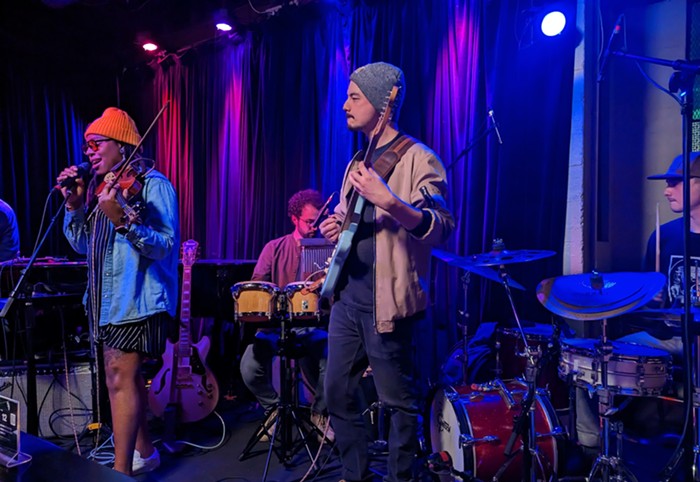ABOUT 60 PEOPLE are packed into a basement venue with the unlikely name of "My Friend Ben Scott's House." On other days, the house is the Southeast Portland residence of the band Sioux Falls. But on this Saturday night, a combination of sweat and beer drip from the ceiling, and a single backlight illuminates Sioux Falls.
Their rowdy set is just winding down, bringing an end to a night of friends, barbecue, and local music. A basket goes around to collect gas money for the evening's touring band, who performed earlier. The room falls silent. Guitarist Isaac Eiger looks up past the crowd to make sure the basement door is closed and keeping the room soundproofed before bassist Fred Nixon launches into a punk cover of R. Kelly's "Ignition (Remix)" for Sioux Falls' encore. Everyone erupts in a well-timed bounce, clutching their drinks and shouting the lyrics back at the trio.
House shows like these provide a valuable space for do-it-yourself musicians to play in inclusive, all-ages settings. Portland basements were once a stronghold for these types of house shows through the '00s, but the scene was diminished by the disappearance of venues like Dekum Manor, Robot Steakhouse, and the Pink Room.
Now it seems that house shows—and their attendant scenes—are gradually returning to the city. In Sioux Falls' case, they've joined forces with other local bands and friends to form the Semi-OK Collective, based on their shared love of each other's music. The scene has vague sonic similarities, and bands tend to fall somewhere on the indie-emo grayscale, ranging from Snow Roller's western-tinged power pop to Sioux Falls' Modest Mouse-esque emotional post-punk, from Blowout's weighty distorted pop-punk to Caregiver's twinkly screamo. It was not until earlier this year that they gave themselves a name by creating the Facebook group "PDX Semi-OK Shows" to make it easier to communicate about their musical projects.
"We had been in Portland since 2011 and hadn't felt any sort of acceptance. We just all started playing shows together, and slowly people actually started coming out, which was a fucking trip," says Eiger. "I've never had a friend group like this before. It is so cool when your relationships with your friends are based around doing the thing that you love."
Sioux Falls, Snow Roller, Dana Meyer, and the recently disbanded Robot Boy recently released a four-way split EP, Entering Yolo County, as the first release from Semi-OK's new record label, Strange Ranger. And Blowout, Sioux Falls, and Snow Roller are all either recording or releasing their first full-length albums this summer. The first issue of Semi-OK's online zine launched on July 1, containing contributions from musicians, poets, and artists connected to the collective.
The all-ages music scene has been struggling in Portland for some time. In May, the Mercury published an article called "Pricing Out Portland's Artists" [Feature, May 27] showing how rent increases have affected local visual artists. Things aren't any better in the music community. All-ages venues like Laughing Horse Books, the Red and Black Café, Slabtown, and, most recently, the Alhambra Theatre have announced their closures in the past year. It's driven musicians within DIY communities like Semi-OK to utilize the classic makeshift venue—their own homes.
"House shows are just a necessity because there aren't enough all-ages spaces," Eiger says. "A year ago, I wasn't even 21—I have very recent memories of what it's like not being able to go see a band I like."
Typically, these house shows take place in a room that on any other day might be used for storage, sleeping, or practice. The band provides the music and the space, and they don't play on a stage or behind a barrier; they're on the same level as the audience, sometimes only feet away.
"It sucks to have to play a venue where people have to pay a lot of money to see a show when we aren't a touring band," says Blowout's lead vocalist and bassist, Laken Wright. "House shows are great because they cost little to nothing, and they foster this fun, communal environment where there isn't some person who owns the spot monitoring you."
However, house shows do come with limitations. Bands face noise complaints and subsequent police involvement that can end a show early. Inevitably issues arise as DIY bands rely heavily on community support, and if shows get too crowded, property damage can directly affect the artists who live there.
For instance, during a New Year's Eve show at the house of Snow Roller bandmates Nathan Tucker and Collin Kritz, an attendee broke a window and peed in Kritz's bedroom. That's an unfortunate result of a house show gone wrong, but the tightknit DIY community proved to be a strong support system, and Travis King of Blowout gave Kritz $100 for repairs.
"DIY means working under a lot of restrictions, whether that's not having a lot of money, equipment, or places to play," says Wright. "And in this community we celebrate those restrictions and [don't let] them hold us back from creating art. I have friends coming from California who will ask me if I can find them an all-ages venue to play in Portland and I'll tell them, 'I can find you a basement.'"



















